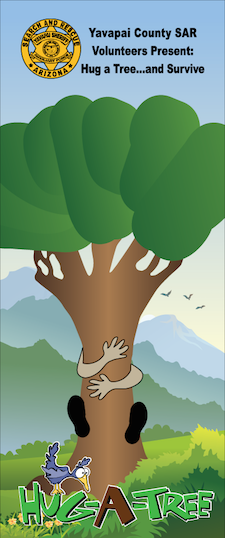Man Rescued following Ground and Air Effort while Uninvolved Person hinders the work of Rescuers
On February 15, 2015, just after 1 PM, YCSO deputies were called out to the Thunder Mountain Trail on Capitol Butte in Sedona regarding a 66-year-old man from Idaho who was stuck on a ledge. The man had hiked to the top of Capitol Butte and upon descent he took the wrong trail which led him to an area where he could no longer descend, in part, because of a prior shoulder injury. The man was calm during his contact with deputies and remained stationary as requested.
To aid in pinpointing his location, YCSO’s Rescue 1 helicopter was called out along with members of the Yavapai County Search and Rescue Team, Back Country Unit (BCU). Using landmark information provided by the stranded subject, the Rescue 1 Crew was able to locate the man and confirm that a ‘technical’ rescue involving rope lines would be necessary. BCU rescuers were able to climb to the subject’s location and secure him for transport. A DPS Ranger helicopter arrived to provide a short haul airlift to base camp and completed the rescue just after 5 PM.
During the rescue effort, a male who lives in the area indicated he wanted to help the stranded subject on his own. The “helper” was apparently very familiar with Capitol Butte topography having assisted people off the mountain in the past. In this case though, deputies indicated he became a hindrance and prolonged the rescue effort. During the rescue, this man’s wife contacted deputies at base camp and told them her husband was in the process of climbing Capitol Butte to rescue the stranded subject. Even after relaying a message to him to cease involvement, including direct contact by members of the BCU team on site, the man refused to leave the rescue scene. A short time later, deputies explained to him that the helicopter would not airlift the stranded subject until he left. He then complied.
The concern for rescuers regarding this intrusion was that the wind generated from the DPS helicopter could result in falling debris and other hazards which would place the “helper” in danger. Additionally, rescuers had to take their time and focus off the stranded subject to deal with this man causing unnecessary and unjustified risk to the rescuers.
While an offer to help is always appreciated, in this case it became a distraction to the immediate concern for the stranded climber. Deputies explained that the “helper” would not have been asked to leave unless there was concern for his safety which in turn was causing a delay with the rescue. In the end, the stranded subject was safely rescued, but the effort took longer than needed due to this individual refusing to leave the area when asked. If time had of been a factor in this rescue (due to the subject being injured, etc.) the delay caused by this man’s actions could have ended with disastrous results for the person who actually needed the help.






































